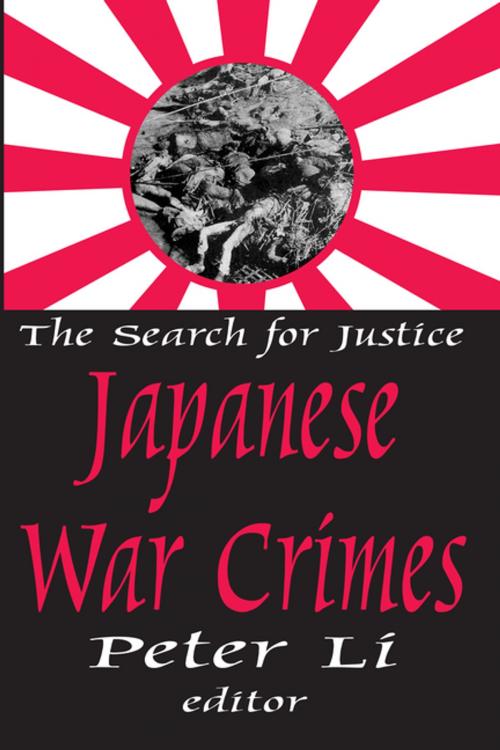Japanese War Crimes
Nonfiction, Social & Cultural Studies, Social Science, Crimes & Criminals, Criminology, History, Military| Author: | ISBN: | 9781351511087 | |
| Publisher: | Taylor and Francis | Publication: | July 12, 2017 |
| Imprint: | Routledge | Language: | English |
| Author: | |
| ISBN: | 9781351511087 |
| Publisher: | Taylor and Francis |
| Publication: | July 12, 2017 |
| Imprint: | Routledge |
| Language: | English |
The question of national responsibility for crimes against humanity became an urgent topic due to the charge of ethnic cleansing against the previous Yugoslav government. But that was not the first such urging of legal and moral responsibility for war crimes. While the Nazi German regime has been prototypical, the actions of the Japanese military regime have been receiving increasing prominence and attention. Indeed, Peter Li's volume examines the phenomenon of denial as well as the deeds of destruction.
Certainly one of the most troublesome unresolved problems facing many Asian and Western countries after the Asia Pacific war (1931u1945) is the question of the atrocities committed by the Japanese Imperial Army throughout Asia and the Japanese government's repeated attempts to whitewash their wartime responsibilities. The psychological and physical wounds suffered by victims, their families, and relations remain unhealed after more than half a century, and the issue is now pressing. This collection undertakes the critical task of addressing some of the multifaceted and complex issues of Japanese war crimes and redress.
This collection is divided into five themes. In "It's Never Too Late to Seek Justice," the issues of reconciliation, accountability, and Emperor Hirohito's responsibility for war crimes are explored. "The American POW Experience Remembered" includes a moving account of the Bataan Death March by an American ex-soldier. "Psychological Responses" discusses the socio-psychological affects of the Nanjing Massacre and Japanese vivisection on Chinese subjects. The way in which Japanese war atrocities have been dealt with in the theater and cinema is the focus of "Artistic Responses." And central to "History Must not Forget" are the questions of memory, trauma, biological warfare, and redress. Included in this volume are samples of the many presentations given at the International Citizens' Forum on War Crimes and Redress held in Tokyo in Decem
The question of national responsibility for crimes against humanity became an urgent topic due to the charge of ethnic cleansing against the previous Yugoslav government. But that was not the first such urging of legal and moral responsibility for war crimes. While the Nazi German regime has been prototypical, the actions of the Japanese military regime have been receiving increasing prominence and attention. Indeed, Peter Li's volume examines the phenomenon of denial as well as the deeds of destruction.
Certainly one of the most troublesome unresolved problems facing many Asian and Western countries after the Asia Pacific war (1931u1945) is the question of the atrocities committed by the Japanese Imperial Army throughout Asia and the Japanese government's repeated attempts to whitewash their wartime responsibilities. The psychological and physical wounds suffered by victims, their families, and relations remain unhealed after more than half a century, and the issue is now pressing. This collection undertakes the critical task of addressing some of the multifaceted and complex issues of Japanese war crimes and redress.
This collection is divided into five themes. In "It's Never Too Late to Seek Justice," the issues of reconciliation, accountability, and Emperor Hirohito's responsibility for war crimes are explored. "The American POW Experience Remembered" includes a moving account of the Bataan Death March by an American ex-soldier. "Psychological Responses" discusses the socio-psychological affects of the Nanjing Massacre and Japanese vivisection on Chinese subjects. The way in which Japanese war atrocities have been dealt with in the theater and cinema is the focus of "Artistic Responses." And central to "History Must not Forget" are the questions of memory, trauma, biological warfare, and redress. Included in this volume are samples of the many presentations given at the International Citizens' Forum on War Crimes and Redress held in Tokyo in Decem















